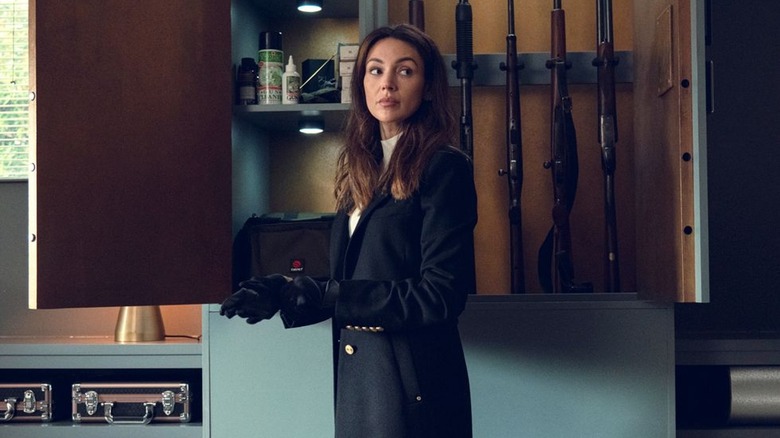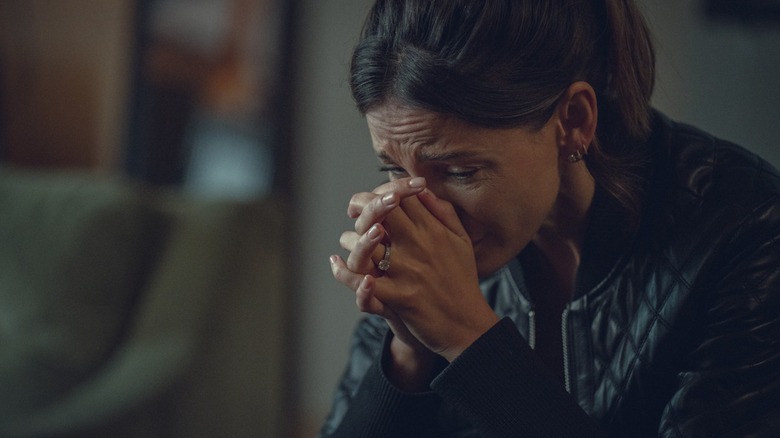Fool Me Once Ending Explained: Baffling Twists And Rushed Resolutions
This post contains spoilers for Netflix's "Fool Me Once."
Every Harlan Coben novel ends with a trademark twist. The shocking nature of these revelations usually re-contextualizes our understanding of established character motivations and leads to breakthroughs in unsolvable cases. Coben's "Fool Me Once," adapted by Netflix into an eight-episode series, employs a similar trope by introducing a twist that questions our allegiance to the central protagonist. The problem, however, is that these subversions are not backed by narrative logic and quickly fall apart once probed on a superficial level.
"Fool Me Once" is a murder mystery/thriller that opens with the death of Joe Burkett (Richard Armitage), who seems to have been shot during a street robbery gone wrong. His wife, ex-military pilot Maya Stern (Michelle Keegan), is grieving both the death of her husband and her sister, Claire (Natalie Anderson), who died over the span of a few months. While Maya initially intends to grieve these tragic deaths at her own pace, some baffling footage caught on her nanny cam unravels her world, leading her on a path of no return, where she is hell-bent on finding whoever is responsible for the murder of her loved ones.
When a protagonist is motivated by retribution, it is natural to root for them and believe their perspective, no matter how convoluted or intense it feels as the episodes progress. But what happens when such a protagonist is unveiled as an unreliable narrator during the series' climax? This kind of subversion only works when subtle visual cues are planted consistently to support such a turn of events, which is unfortunately not the case with "Fool Me Once." With this in mind, let us unpack the baffling, rushed ending of the Netflix thriller series, and whether these twists work in favor of the show.
What to remember about the plot of Fool Me Once
The series starts with a confusing flashback of various masked students hazing one of their classmates while donning masks in a ritualistic manner. This jarring sequence is replayed several times without any context and is eventually revealed to be the key to solving the reason behind Joe and Claire's sudden deaths. The catalyst for Maya's investigation is the nanny cam footage that captures a man who looks like Joe on the day of his funeral, prompting Maya to think that her husband is alive and that Claire's death — which was officially also deemed as a robbery that got out of hand — was not accidental but premeditated.
Coben's narrative weaves together these convoluted threads to paint an even more tangled portrait of lies, deceit, and misdirects, some of which work, while most of it falls flat. Several instances of sleuthing reveal that Claire was contacting someone operating secretly from an arcade parlor — namely, whistleblower Corey the Whistle (Laurie Kynaston), who had previously exposed Maya for killing innocent civilians during a mission to save her ex-army teammates. Corey reveals that Claire made a deal with him to protect her sister from further public scandal in exchange for valuable intel about the corrupt Burkett family, who runs a pharmaceutical conglomerate. This revelation directly casts doubts on Joe, his mother, and the Burketts as a whole, further intensifying the web of mystery.
Then there's Detective Kierce (Adeel Akhtar) leading Joe's murder case, who experiences blackouts and finds himself in rather dangerous situations (such as crashing into a fence and having no recollection of it). While Kierce appears to be in cahoots with the Burketts at one point, this is yet another misdirect to prop up the ridiculous twist at the end.
What is the truth behind the deaths in Fool Me Once?
The moment Corey mentions that the Burketts use their pharmaceutical company to run corrupt schemes, including passing illegal drug trials and poisoning the common populace, the truth becomes painfully clear. Claire, who used to work for the Burketts alongside Joe, had stumbled upon these unsavory truths and was quickly silenced due to her supposed transgressions. In fact, it was Joe who had killed Claire, staging it as a robbery to evade suspicion, as he did not wish his family's legacy to be tarnished at any cost.
Remember the flashback to a ritualistic college hazing that is referenced time and again? Joe was the primary instigator during this hazing years back, leading to the death of his classmate, Theo Mora. Joe's brother, Andrew, who is officially known to have died in a boat accident years later, felt so guilty about this death that he threatened to go to the authorities. Forever the upholder of personal freedom at the cost of others, Joe pushed his brother off the boat and his family paid hush money to the captain, Tommy Dark, for the next 26 years. In the present, Dark is found dead, and it is clear that Joe was the one who killed him before his own demise.
The revelation that Maya's husband was a serial killer naturally makes us want to root for her even more intensely, as she is justified in avenging her sister's death and exposing the corrupted machinations of the Burketts. However, the final twist paints Maya in a more complicated light. On the night of Joe's death, it was Maya who shot him after switching his gun with a fake, as she already had her suspicions about Joe's serial murders, including that of her sister.
Why the final twist in Fool Me Once falls apart
Consider this: a woman finds out that her husband is a serial murderer and decides to confront him about his actions. She is aware that he might harm her eventually, so she preemptively switches out his weapon with a fake. Even so, when things escalate, she has to shoot him in self-defense and cover up the murder as a night-time robbery. The only problem is that a bystander witnesses these events and eventually tells the police the truth, implicating her in her husband's murder weeks later.
While such a premise would have worked when executed carefully, "Fool Me Once" squanders this potential by firmly rooting us in Maya's perspective. We follow her closely throughout the series and are even privy to her innermost thoughts, her latent traumas, and her dogged determination to solve the case. The issue, however, is that she is already aware of the truth, which makes her arc redundant and makes us question her narrative reliability throughout. The unreliable narrator/protagonist can be a brilliant device when done well, but in Maya's case, it simply does not work. Surely, an intelligent ex-officer like her understands that delving into a case about her dead husband will only implicate her further and defeat the very purpose of her master plan? More importantly, while pursuing these leads, Maya unnecessarily endangers her daughter, Lily, who also gets neglected in the process.
As for the nanny footage that started it all, it was a deep fake of Joe, implanted deliberately by his mother to distress Maya enough to make her confess the truth. Apart from making very little sense, this complicates motivations for no good reason, as it involves too many factors that do not add up or pay off by the end.
What does the ending of Fool Me Once mean?
In the end, Maya confesses to Kierce, who decides to help her expose the Burketts after he realizes that his illness is caused by the harmful drugs available to the masses (so harmful that he even hallucinates his dead fiancee). Maya visits the Burkett estate and uses the same photo frame nanny cam to make the family confess their crimes, which is covertly live-streamed to millions. In another unnecessary twist, she leaves her gun within reach of the accused and one of Joe's siblings shoots her. While this is played off as a heroic sacrifice, was it really worth it, especially considering that Lily is just a toddler with no one to look after her?
The series resolves this issue quickly by revealing that Maya had planned her death and left Lily in the care of her sister's husband, but this sacrifice still feels unwarranted and far-fetched. Nevertheless, the Burketts are implicated, the truth about the murders is exposed, and Lily grows up to be a well-adjusted adult, as shown in the epilogue, which takes place 18 years later. The sole reason behind this epilogue is to show that Lily is now a mother and that she has named her child. .. Maya. With this rather saccharine sentiment, "Fool Me Once" concludes its narrative, which feels rather hollow coming after such a string of nonsensical twists and turns.
As for the million red herrings that are strewn across the series, it is best to not expect any answers and chalk them up to deliberate misdirects, which are never resolved or addressed later at any point. In conclusion? There is a lot more fooling than promised, and it is unclear who should bear the onus of shame after the credits roll.




